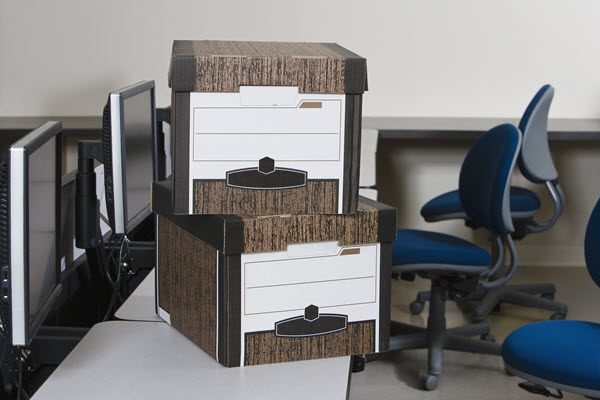How to Prepare for An Office Move: Top Tips You Should Know
By Helen Halfpenny
September 25, 2019 • Fact checked by Dumb Little Man

Moving premises is an issue that's likely to come up for most business owners at some point. Although it can be stressful, it's not something you need to be afraid of.
If you’re moving offices, this is normally something to celebrate. It’s a sign of growth, expansion, and being on a positive path. This is particularly true if you have to move offices to accommodate more staff and clients. An office move makes sense financially and logistically, too.
To help business owners who are experiencing an imminent move, WD Storage made this really helpful infographic on how and when to move offices smoothly. They've included some statistics you’ve probably never seen before and offer up some pearls of office relocation wisdom that you may not have considered previously.
There’s one serious downside to moving offices that can’t be ignored, and that’s the stress of it all. It’s likely to have a very detrimental effect on the workload and stress levels of pretty much everyone in the office. Fortunately, there are ways to minimize this stress and make the move happy and prosperous for your business and staff.
When Should You Move Office?

You may toy with the idea of moving offices at various points, but not actually explore it in detail. So, when do you give that idea a serious thought?
- At the end of your lease
- When you have available budget to cover all the costs
- When your business is in a good financial situation
- At the quietest time of the year for you
- When you’re expecting to reach or go over your workplace capacity in the next five years
If you’re able to combine several or even all these elements into your moving plan, things will definitely be easier for you. If there are big projects or busy times on the horizon, it may not be the best time to move. Also, be confident that your business is financially sound enough to absorb the cost (the average UK cost of an office move is £40k!).
Don’t just include quoted costs in your planning. Have budget set aside for any unexpected costs, too.
How to Choose a New Office
Moving to a new office will require you to consider and make allowances for a lot of moving parts. The first thing you should do is communicate the plan with your staff as early and as comprehensively as possible. If people know about it early, they can get used to the idea of change and figure out whether they’re going to come along for the ride.
Another thing you have to consider is your current staff. Communicating with your team will give you some idea on areas where people won’t follow you. It will also help you to understand what your team wants from the new office.
Surveys have found that 45% of employees want green space at their place of work, even if it’s just to look at from their window. 40% felt like there weren’t enough informal ‘breakout’ areas in their office. 51% want a place where they can get away from their desk.
Ask your staff what they want from the new office. You will never, ever be able to please everybody. Some people won’t be happy with the move (generally a minority) but mostly, people will be excited for a change. It's your job to make sure they're excited about it. It’s also up to you to figure out what to prioritize.
When it comes to size, you should have around 95 square feet for each person. Think ahead about whether your office is future-proofed as well.
Can you see yourself employing more staff in the future? Will your new office have space to accommodate new hires/products/equipment?
Physical location is important, too. If your new office more than doubles everyone’s commute, for example, or is impossible to reach by public transport, you may lose staff in the process. While more remote offices tend to be cheaper, you could pay a price in struggling to attract people to work there.
Think about your clients, too. Will a remote location be conducive to attracting new clients? And if the only way to get to you is to drive, is there enough parking for both staff and clients?
Consider local amenities. Are there places to eat nearby? A shop? A gym? A park?
There are ways in which you don't have to move to a new office that’s super high-spec to gain some pretty amazing perks. Simply move to an area which has better amenities.
Having restaurants nearby is great for client relationships and your staff. A nearby gym can promote and facilitate a healthy lifestyle. Nearby parks, greens or commons give your staff a place to go to and stroll around. These places will allow them to stretch their legs and clear their mind, fostering a more peaceful and productive work environment.
And of course, make sure your office is accessible. If you have staff with disabilities or who are in advanced age, that is essential. If not, you should still do so anyway. Prospective clients and staff may have those needs. Be thankful that you don’t and provide for those who do.
How to Prepare for An Office Move

As mentioned previously, no matter the circumstances, moving offices is going to get stressful for lots of people. 31% of business owners said that moving premises is the most stressful thing they could undertake.
Here are some tips you can take to reduce that stress to a minimum:
Delegate
Don’t take on the workload yourself. The amount of planning, administration, and work that needs to be done is too big for one pair of hands. Designate a project team made up of various highly organised members and let them handle the different aspects of the move.
Let the creative types handle the new office design. Allow the most analytical to handle all the processes.
Do you have an office or facilities manager? This is a great task for them. As your office manager, they’re going to need to have a deep and thorough understanding of the new premises.
You have a team of paid staff. Why not use them?
Delegation will make things easier. It gives more people ownership in the move, making them more enthusiastic and invested in it.
Planning
If you plan everything absolutely meticulously, then you’re giving yourself the best chance of relocation success. There is no such things as over-planning with this. The more rigorous you are in your planning, the more impervious to unexpected bumps in the road you will be.
Planning well will minimize any unexpected tragedies, anyway. From the timescale to where the new furniture is going, get everything planned and visualized.
Budgeting
Decide on and manage a budget for the move. This is going to be a hard thing to do but bear in mind that the average office move costs around £40,000. This should come under your planning, but you’ll need to create a mighty spreadsheet or equivalent for this.
Set yourself a budget target and track how you actually get on with it. That way, you can see how close you are to your budget in real time.
Auditing
An office move is a really good time to review and audit your business in terms of supplies, furniture, and equipment.
Is it worth lugging all those old PCs and musty chairs into your spangly new office? Or is time to invest in something new?
You can also use this time to think about your suppliers in terms of equipment and your utilities.
Communication
We’ve already advised it, but communication at all stages of the move is super important. From your staff to clients to suppliers, let everyone that needs to know what your plans are.
Most importantly, you need to be communicative with your staff. Listen to their wants and needs with regards the move and do your best to try and meet those. You won’t please everybody, but you can give it a good go!
If you're thinking about an office move for your business, then congratulations! That means things are probably going well. And while moving will be stressful, it is possible to mitigate the stress with plenty of communication, careful organization, and stringent planning. Good luck!
See Also: How to Keep Business Data Secure When Transitioning to a New Office?
Helen Halfpenny
Helen Halfpenny is a copywriter based in Nottingham. She writes about all sorts of things, from homes and lifestyle, to crafting, to pop culture, and loves nothing more than a cup of tea and a slice of cake.


